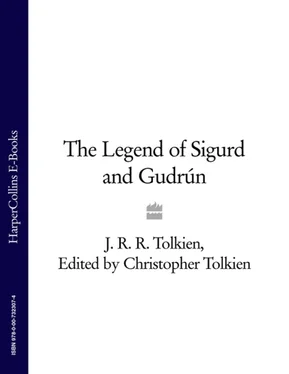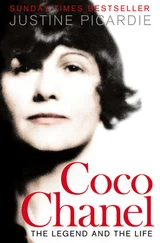J. Tolkien - The Legend of Sigurd and Gudrún
Здесь есть возможность читать онлайн «J. Tolkien - The Legend of Sigurd and Gudrún» — ознакомительный отрывок электронной книги совершенно бесплатно, а после прочтения отрывка купить полную версию. В некоторых случаях можно слушать аудио, скачать через торрент в формате fb2 и присутствует краткое содержание. Жанр: Старинная литература, на английском языке. Описание произведения, (предисловие) а так же отзывы посетителей доступны на портале библиотеки ЛибКат.
- Название:The Legend of Sigurd and Gudrún
- Автор:
- Жанр:
- Год:неизвестен
- ISBN:нет данных
- Рейтинг книги:5 / 5. Голосов: 1
-
Избранное:Добавить в избранное
- Отзывы:
-
Ваша оценка:
- 100
- 1
- 2
- 3
- 4
- 5
The Legend of Sigurd and Gudrún: краткое содержание, описание и аннотация
Предлагаем к чтению аннотацию, описание, краткое содержание или предисловие (зависит от того, что написал сам автор книги «The Legend of Sigurd and Gudrún»). Если вы не нашли необходимую информацию о книге — напишите в комментариях, мы постараемся отыскать её.
The Legend of Sigurd and Gudrún — читать онлайн ознакомительный отрывок
Ниже представлен текст книги, разбитый по страницам. Система сохранения места последней прочитанной страницы, позволяет с удобством читать онлайн бесплатно книгу «The Legend of Sigurd and Gudrún», без необходимости каждый раз заново искать на чём Вы остановились. Поставьте закладку, и сможете в любой момент перейти на страницу, на которой закончили чтение.
Интервал:
Закладка:
My father did not discuss in these notes the development, in incompatible ways, seen in the Völsunga Saga , of the story of Sigurd and Brynhild in the Norse tradition. But his opinion on the cardinal question seems clear from a passing observation elsewhere that, in his view, the drink of forgetfulness given to Sigurd was ‘invented by the author of the lost Sigurðarkviða en meiri [see p.234] to account for the difficulties raised by the previous betrothal of Sigurd and Brynhild.’
In conclusion, he wrote: There is nothing left for us now, therefore, but to express surprise that the author of the Saga, who could so decisively and unhesitatingly adopt one of the conflicting accounts of the murder, could not adopt a single view of Brynhild. Since the adoption of a single view of the murder must be due to artistic preference, one is perhaps only being just to the author of the Saga in assuming that the vagueness and uncertainty of Brynhild’s position was not pure bungling on his part. He wanted a complex of conflicting motives and emotions for the central tragedy – to have these he was content to leave the previous relations of Brynhild and Sigurd confused. He had to, since each theory contributed to her motives.
In the Saga Brynhild’s passion of rage and grief is in part due to pride – she has not wedded the supreme hero (and hates Gudrún on that account); but also, she has been wedded by a trick (and hates Gunnar and Sigurd on that account). Her oath has been broken and she hates herself. She really loves Sigurd alone: her heart’s desire is frustrated, and she would kill what she loves rather than let a rival share it. Her betrothal to Sigurd has been broken by both of them – both by fate and by magic. She is wroth with Sigurd (and herself) on this account – and will not in any case endure her marriage to Gunnar longer. Behind all hangs Ódin, and his doom, and the vanity of her vows – he doomed her to wed. Inextricably interwoven is the curse on the gold.
Truly complicated! And though in building up largely a product of accident, its retention is due perhaps to taste. We may accept this, even if we are still on safe ground in affirming that a better artist could have retained all that was necessary of the two divergent Brynhild-heroines and not made them so obscure and indeed contradictory and unintelligible.
Earlier Workings of
Völsungakviða en nýja
The earlier manuscript material of the Upphaf is not easy to interpret. There are two versions, which are readily placed in sequence: these I will call for ease of reference text A and text B. The first, or text A, with the title Upphaf , has almost as many stanzas as the final form, but not all in the same order, and the wording constantly differing, if for the most part only slightly. The opening stanza is among those that underwent the most change to reach the final form:
Ere the years there yawned
yearless ages,
without sand or sea
silent, empty;
Earth was not moulded
nor arched Heaven:
an abyss gaping
without blade of grass.
Stanza 4 (‘Unmarred their mirth. . .’) was not present. Stanza 13 (in text A stanza 12) reads:
The wolf for Óðinn
at the world’s ending (> waits unsleeping),
for Frey the fair
flames of Surtur;
the doom of Thór
the Dragon beareth:
all shall be ended
and Earth perish.
Though not so marked in the manuscript, the words of the Sibyl clearly end here, and stanzas 14–15, in which the Sibyl speaks of the rôle of Sigurd at the Ragnarök, are here absent. Then follow in A stanzas 16–20 of the final text, the conclusion of the Upphaf , in which the Gods prepare for the Last Battle according to the prophecy, and ending with the words ‘for one they waited, / the World’s chosen’. In A at this point the meaning of those words is not explained. But in this version it is the stanzas 14–15 of the final form, absent here from the prophecy of the Sibyl, that form the conclusion of the Upphaf . The first reads:
In Day of Doom
he should deathless stand
to die no more
who had death tasted,
the serpent-slayer.
seed of Óðinn,
the walls defending,
the World’s chosen.
And the concluding stanza in text A is virtually the same as stanza 15 in the final form. Thus the prophecy concerning Sigurd is present in A, but not as the words of the Sibyl.
The second text B is not titled Upphaf but The Elder Edda (the reason for this will appear in a moment). It is far closer to the final form in the detail of its wording, indeed it only differs here and there. That it was developed from text A is clear from the pencilled corrections made to A that appear in B as written. But it is much shorter than A. The opening stanza is absent (the poem begins ‘The Great Gods once / began their toil’) – but stanza 1 in the final form (‘Of old was an age / when was emptiness . . .’) is scribbled in pencil in the margin. Stanza 4 (‘Unmarred their mirth. . .’) is also absent, as it is in A; but most curiously, the whole of the prophecy of the Sibyl (stanzas 10–15) is missing. The B-text has thus only 12 stanzas. The last verse begins ‘The guests are many’; and the last lines of the verse read, not ‘for one they waited, / the World’s chosen’, as in A and the final text, but ‘long awaiting / the last battle’. Thus the motive of Sigurd as (in Ódin’s hope) the saviour at the Ragnarök is absent.
This truncated version of Upphaf is the opening of a paper read to, or perhaps more probably designed to be read to, a society, presumptively at Oxford. The first words following the poem were:
And that is, I think, all I have to say (of my own) concerning the Elder Edda. There is the ancient measure and strophe in which most of it is written – in which our own poetry was once composed, and in which it still can be if one will learn the craft (not an easy one) – there is the background of the imagination of its poets; and though this is not a translation of an Eddaic poem it is just like one, and all its elements may be found in that book, most of them in the very first poem of all which deals directly with this very theme.
Only the opening paragraphs of the paper are preserved, either because they were written on the same page as the last stanza of the poem and the rest was discarded, or because the paper never went beyond this point, at any rate in this form.
There is no indication of date. There is also no way of knowing for certain why my father reduced the poem in this way; but a perhaps plausible explanation offers itself. The earlier text A had introduced his very strange and distinctive conception of ‘the special function of Sigurd’, ‘an invention of the present poet’, in his words (see Commentary, pp.183–85). He now had the idea of introducing his paper with a brief recital of a piece of his own ‘Norse’ poetry; but to use his Upphaf for this purpose would require the omission of all the verses that bore upon the idea of ‘the World’s chosen’, the ‘special function of Sigurd’ – the imposition of a new significance on the myth.
Did he see this brief work, when he wrote it, as the prelude to a long poem on the legend of Sigurd? It seems impossible to say (the title Upphaf does not necessarily imply this: it may refer to the content of the poem, as I incline to suppose).
The other surviving earlier texts mentioned on p.40, section I of Völsungakviða en nýja , ‘Andvari’s Gold’, and the first nine stanzas of section II, ‘Signý’, stand to the final form as does text A of the Upphaf , in that there is constant difference in detail of vocabulary and phrasing.
Читать дальшеИнтервал:
Закладка:
Похожие книги на «The Legend of Sigurd and Gudrún»
Представляем Вашему вниманию похожие книги на «The Legend of Sigurd and Gudrún» списком для выбора. Мы отобрали схожую по названию и смыслу литературу в надежде предоставить читателям больше вариантов отыскать новые, интересные, ещё непрочитанные произведения.
Обсуждение, отзывы о книге «The Legend of Sigurd and Gudrún» и просто собственные мнения читателей. Оставьте ваши комментарии, напишите, что Вы думаете о произведении, его смысле или главных героях. Укажите что конкретно понравилось, а что нет, и почему Вы так считаете.












